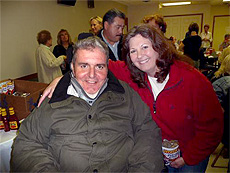Joe Leo
 |
| Joe Leo and Kathy Graden at a fundraising event in October. The event raised money to buy handicapped-accessible equipment. |
Joe Leo, who worked in the ES&H section for 26 years, died Sunday. He was 53.
As a radiological control technician, Leo's primary job was preparing waste for shipping or storage. Leo also was Fermilab's sealed source technician; he maintained and inventoried Fermilab's calibration sources for use in the laboratory's high-energy physics experiments.
His supervisor Billy Arnold said Leo's frequent visits around the laboratory made him a familiar face.
"He seemed to pretty much become friendly with anyone within minutes," Arnold said. "He was just a great talker and very comfortable discussing almost anything with anyone."
Leo had been a self-motivated and meticulous worker, Arnold said. With so many years of experience, Leo could offer scientists useful background information about calibration sources.
"When physicists needed something, he just knew what type of materials they would need," said Martha Michels,ES&H deputy head.
Leo was unable to return to work since March, when a skiing accident in Wisconsin paralyzed him from the chest down. Before the accident, Leo was active outdoors and had been a member of Fermilab's volleyball team, bowling team and golf league.
Colleagues made frequent visits to Leo after the accident and in August attended a charity event to raise money for making his home more accessible. Nancy Grossman, head of the ES&H section, said Leo showed his strength and kindness before and after the accident.
"Young people have that sparkle in their eyes, and Joe still had that sparkle," Grossman said. "Whenever people met with him, he could make them smile."
Visitation will take place today from 3-9 p.m. at Williams-Woodward Funeral Home at 820 Pine St. in West Chicago. Funeral services will take place at 10:30 a.m. Thursday at Immanuel Presbyterian Church at 29W260 Batavia Road in Warrenville.
— Chris Knight |